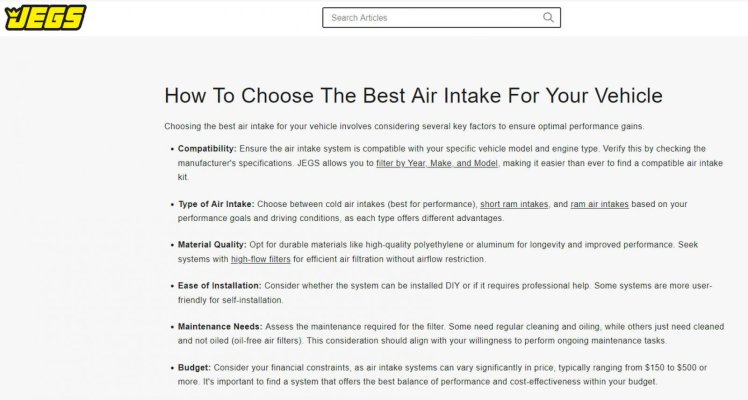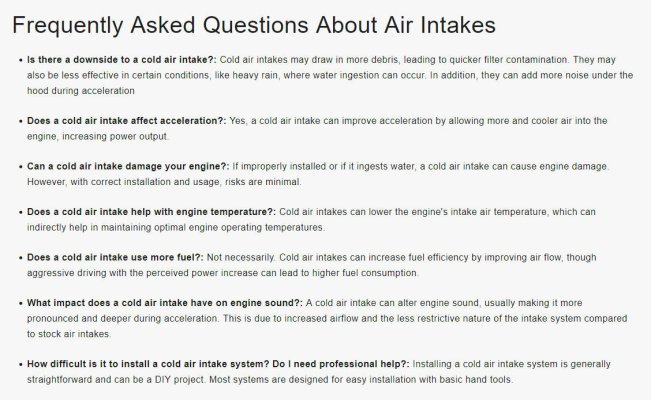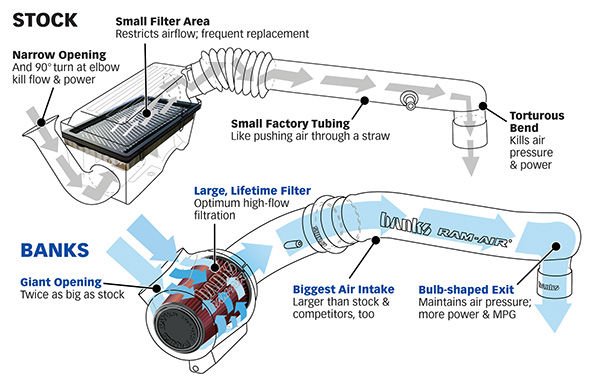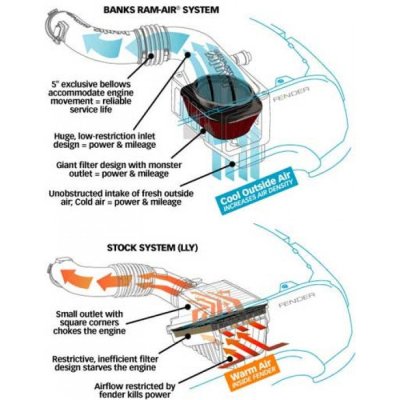I was at the auto parts store the other day and they also sell some speed stuff. There was a "discussion" going on as to what air filters are best and if cold air packages actually do anything.
I have been into cars, engines, horsepower, etc for about 60 years and over that time one of the perpetual discussions is around air filters and what is best for horsepower, filtration, lifespan, plus whatever else folks came up with at the time.
I have basically run the perceived higher end paper element filters in all the stock cars as they are never going to be "fast" or see the high rpms that need massive airflows. Of course, they would benefit a bit from low pressure drop over all airflows, but not as much because that drop is low at low flows, and now that carbs are long gone it does not make any difference in mixtures at all, and not much in response and things.
On the engines that I wanted to make maximum power I used K&N for the most part. Mostly because of the low pressure drop because I was building turbocharged engines and turbos hate inlet pressure drops. The most powerfull was a twin turbo Dodge 340cid engine that made 600hp back in the 90's and was very fast for those days.
On the stockers, I have never seen much of any dirt on the clean side of the intake ducting as long as there were no leaks in the system. On the K&N ones there would be some light dusting in the areas where the airflow slowed down due to shape of the ducting. The turbo engine had a long inlet tract as it went through an intercooler also.
We have never had any oil burning in the stockers with highest mileage of 212K miles. No oil burning in the turbo engines either as long as they had the right pistons and rings in them, fitted correctly. The highest mileage on the turbo engines was 50K when I tore one down and it did not show any excessive wear, though, with the K&N.
My opinion, and it is just that only is that the K&N filters do pass more dirt, but it is unknown how many miles it would take until it made a difference, if any. We are using Wix filters for oil and air currently, and never use Fram anything anymore after a huge oil filter failure.
The auto parts store overhear made me decide to take another look for good information on the subject as in the past there was only manufacturer claims and backyard testing available and I consider both to be borderline useless if you want unbiased accuracy.
I ran across this article that actually sent filters to a commercial testing company for testing. The article's writing might indicate a bias toward factory products, so keep that in mind when you read it, if you are interested. The article is from 2009.
The results make some sense to me. The best rated filter had the highest pressure drop and lowest dirt allowed past them which is how filters almost always test. It was interesting how some of the middle ones had better combinations of pressure drop vs filtering than others in various ways.
https://www.nicoclub.com/archives/kn-vs-oem-filter.html
I have been into cars, engines, horsepower, etc for about 60 years and over that time one of the perpetual discussions is around air filters and what is best for horsepower, filtration, lifespan, plus whatever else folks came up with at the time.
I have basically run the perceived higher end paper element filters in all the stock cars as they are never going to be "fast" or see the high rpms that need massive airflows. Of course, they would benefit a bit from low pressure drop over all airflows, but not as much because that drop is low at low flows, and now that carbs are long gone it does not make any difference in mixtures at all, and not much in response and things.
On the engines that I wanted to make maximum power I used K&N for the most part. Mostly because of the low pressure drop because I was building turbocharged engines and turbos hate inlet pressure drops. The most powerfull was a twin turbo Dodge 340cid engine that made 600hp back in the 90's and was very fast for those days.
On the stockers, I have never seen much of any dirt on the clean side of the intake ducting as long as there were no leaks in the system. On the K&N ones there would be some light dusting in the areas where the airflow slowed down due to shape of the ducting. The turbo engine had a long inlet tract as it went through an intercooler also.
We have never had any oil burning in the stockers with highest mileage of 212K miles. No oil burning in the turbo engines either as long as they had the right pistons and rings in them, fitted correctly. The highest mileage on the turbo engines was 50K when I tore one down and it did not show any excessive wear, though, with the K&N.
My opinion, and it is just that only is that the K&N filters do pass more dirt, but it is unknown how many miles it would take until it made a difference, if any. We are using Wix filters for oil and air currently, and never use Fram anything anymore after a huge oil filter failure.
The auto parts store overhear made me decide to take another look for good information on the subject as in the past there was only manufacturer claims and backyard testing available and I consider both to be borderline useless if you want unbiased accuracy.
I ran across this article that actually sent filters to a commercial testing company for testing. The article's writing might indicate a bias toward factory products, so keep that in mind when you read it, if you are interested. The article is from 2009.
The results make some sense to me. The best rated filter had the highest pressure drop and lowest dirt allowed past them which is how filters almost always test. It was interesting how some of the middle ones had better combinations of pressure drop vs filtering than others in various ways.
https://www.nicoclub.com/archives/kn-vs-oem-filter.html





